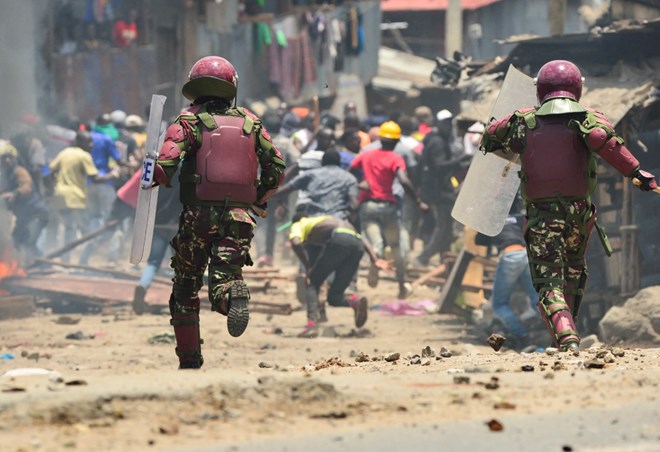
Monday November 25, 2024
- Kenyan authorities have failed to ensure justice for the killing of at least 31 people and other abuses by the police during protests throughout the country from March to July 2023.
- Over a year later, investigations have not been finalized and not a single police officer or government official has been prosecuted for the killings or other serious rights violations.
- President Willam Ruto should ensure that the Independent Policing Oversight Authority can work independently and call on the necessary authorities to follow up on its recommendations.

Riot police officers disperse supporters of Kenya's opposition Azimio La Umoja (Declaration of Unity) One Kenya Alliance, during nationwide protests over the cost of living and alleged fraud during the 2022 elections, in Mathare settlement of Nairobi, March 27, 2023.
© 2023 REUTERS/John Muchucha
Kenyan authorities have failed to ensure justice for the killing of at least 31 people and other abuses by the police during protests throughout the country from March to July 2023, Amnesty International Kenya and Human Rights Watch said in a report released today. Over a year later, investigations have not been finalized and not a single police officer or government official has been prosecuted for the killings or other serious rights violations.
The 77-page report, “Unchecked Injustice: Kenya’s Suppression of the 2023 Protests,” documents that the police, under President William Ruto’s administration, committed grave rights abuses in response to largely peaceful opposition-led nationwide protests. The demonstrations were triggered by the high cost of living and alleged electoral malpractices following the August 2022 general elections.
The report is based on 226 interviews with survivors and witnesses in Nairobi, Kisumu, Nyamira, Machakos, Migori, Kisii, Siaya, Nakuru, Homa Bay, and Makueni counties.
Amnesty International Kenya and Human Rights Watch found that between March and July 2023, police used excessive and unnecessary force against protesters and bystanders, including by using lethal ammunition, kinetic impact projectiles, such as “rubber bullets,” torture and other ill-treatment, arbitrary arrests and unlawful detention, and committed serious abuses against children under the age of 18.
The organizations also found that the Kenyan police disproportionately and indiscriminately used tear gas, notably in and around schools, medical facilities, and residential areas. At least two children died following tear gas exposure in their homes.
During house-to-house searches of suspected protesters in July 2023, police in Kisumu County beat, intimidated, and threatened those they found, including people who were not involved in the protests. They killed three people during the searches, including cousins Brian Oniango’ and William Amulele, who died as a result of injuries from police beatings.
A relative said, “I was in my house when I heard noises outside and voices shouting that the cousins were being killed…. I opened the gate and saw them being beaten. I knelt, pleading with them to leave the boys since they were not part of the [protests], but one officer came and ordered me to get back to the house…. He pushed me with his boots until I fell back, forcing me to step back. They [continued to] beat them.”
The police abuses took physical, mental, and financial tolls on victims and their families. Many interviewed in the ensuing days and months said that their injuries had affected their health and livelihoods. A 50-year-old farmer whose son John was shot dead on July 7, 2023, in Kisii apparently by police, said, “My son supported me in everything. He liked calling me and asking me if I needed any support. He wanted to come home and stay so that he could help me to educate his siblings. John was my eye. The eye has gone…. I don’t know what to do.”
Some survivors and families of victims of abuses reported being turned away from police stations when they attempted to report police abuse. Others said they were not able to or did not make a report to the police because they feared reprisals or believed their report would not lead to tangible action.
The Independent Policing Oversight Authority (IPOA), which provides civilian oversight of police conduct, informed Amnesty International Kenya and Human Rights Watch in an October 29 response to a letter seeking comment that at least 67 people had been killed during the protests between March and July 2023. The IPOA said that they had recommended an inquest in 6 cases by the Office of the Director of Public Prosecutions, closed 4 cases, and are actively investigating cases involving 57 victims. The IPOA said that they had faced numerous problems including a lack of cooperation from witnesses and a tendency by the police to conceal their identities and use unmarked vehicles, which made it difficult to ascertain responsibility.
President Ruto should ensure that IPOA is able to conduct its work independently and call on the necessary authorities to follow up on IPOA recommendations. He should also establish a Commission of Inquiry to investigate the 2023 abuses and ongoing protest-related abuses, including to determine what units are responsible for abuse, identify implicated officers, and determine the orders given to police officers, the use of nonuniformed and noncommissioned officers at protests, and police officers’ use of disguises, the two organizations said.
Further, the Kenyan government should address the root causes of past and ongoing protests, including the government’s economic policies that deprive people of their economic, social, and cultural rights. This could include enacting or expanding social security measures to ensure the income security of those injured by authorities and unable to work, as well as the surviving dependents of those killed, the two organizations said.
“Kenyan authorities should work hard to regain public faith and demonstrate that they can deliver people-centered and human rights-focused reforms,” said Irungu Houghton, executive director of Amnesty International Kenya. “They could start by ending impunity for police abuses during protests and enacting tangible remedies to address the negative impacts of the government’s economic policies.”